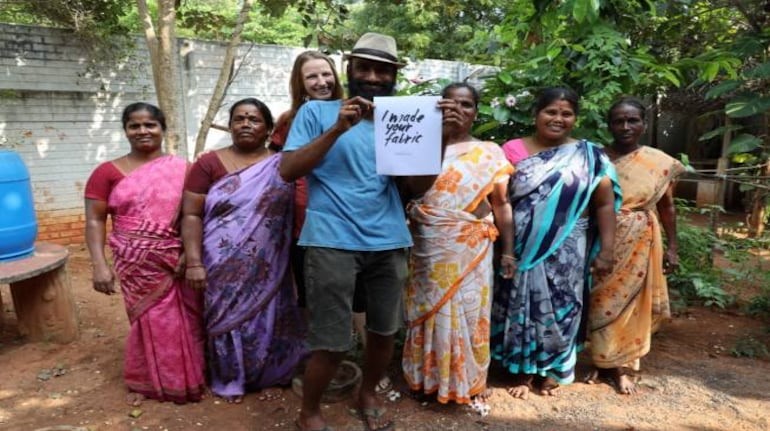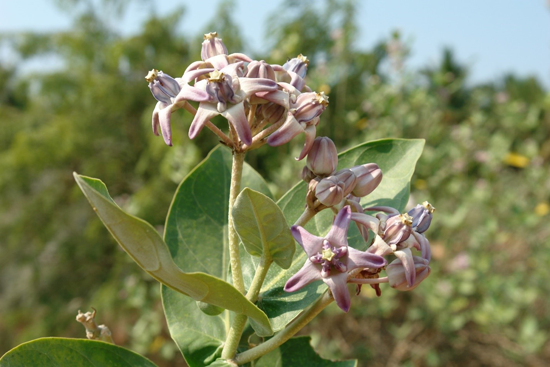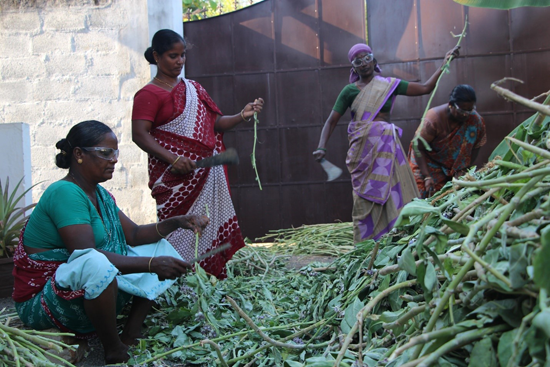
Category: FIBRES
Country: India
Gowri Shankar has produced ‘Weganool’ fibre from a dryland weed and organic cotton and has trademarked the innovation.
The fashion industry has been looking for animal-free alternatives to wool for some time now. Bamboo, hemp, banana, coconut waste… they’ve tried it all. And now they have their eyes trained on an innovation by India’s Gowri Shankar.
The Tamil Nadu man is in the news for producing possibly the world’s first vegan wool that’s zero-waste and also luxurious and warm like Cashmere. Called Weganool, it received a special mention at the famous Future Fabrics Expo in London this January. After which, Infantium Victoria, an award-winning German clothing brand for children, rolled out hoodies, gowns and jackets using this fabric and got other fashion brands and wool manufacturers in Europe curious to sample it.
Weganool is made from 70 percent organic cotton and 30 percent Calotropis plant, a weed that grows abundantly in the dry wastelands of Asia and Africa. In this case, the weed, commonly known as milkweed and eruku in Tamil, is being harvested from a village near Auroville, named Kuilapalayam, in his home state.

Weganool is made from 70 percent organic cotton and 30 percent Calotropis plant
“Calotropis is a wild flowering shrub. It grows back in six months and taller and bushier every time. I have been harvesting it for over two years and I haven’t even gone beyond the five-kilometre radius of my base at Kuilapalayam,” chuckles Shankar, who comes from a family of traditional silk weavers from Tamil Nadu’s Tiruvannamalai district.

Calotropis is a weed that grows in the dry wastelands of Asia and Africa.
Being a desert plant, it requires little to no water and pesticides to thrive. “The production of 1 kg of Weganool with rain-fed cotton yarn saves 27,000 litres of clean drinking water when compared to 100% cotton yarn,” adds Shankar, who started his label Faborg in 2015 after learning of the evils of the textile business while working as a merchandising manager for a fashion house in Chennai.
The inspiration for Weganool came in 2017, when he spotted sunbirds weaving their nest using the Calotropis bush. But he’s not the only one after it. While Shankar mostly works with the pods and stems of the locally-dominant Calotropis Gigantea, Kenyan scientists had successfully extracted a silk-like fabric from the fruits of Calotropis procera in 2018. They had hinted at a collaboration with Chinese textile makers but there’s been no update since. “The reports also suggest that they plan to genetically modify the Calotropis to give higher yield but I won’t do anything that’s not natural,” Shankar declares.
This is where Weganool trumps other vegan alternatives. It’s zero-waste and chemical-free from start to disposal. It is dyed with locally-available marigold, indigo, pomegranate and berries. “Chemical dyeing releases toxic sludge at the end of the process, which is killing our rivers,” Shankar says, an obvious comment on fashion being the second-most polluting industry.

Women extracting wool fibre out of the Calotropis plant.
And after the wool fibres are extracted from the Calotropis, the residual plants are used to make an arka, a liquid solution that acts as both a biofertiliser and a mosquito repellant. “We started by testing arka on cashew, tomato, brinjal, cotton, banana and coconut farms around Auroville, and finalised the product in 2019 by mixing it with herbs. Farmers have found their yield to go up by 10 percent and pest infestation and wilting go down,” Shankar says, informing that nearly 30 hotels are buying Arka as a mosquito-repellent, some as far as in Uttarakhand.
However, when it comes to Weganool, Indian designers haven’t contacted Shankar in big numbers as Europeans and Americans have. “It’s not strange because we don’t have big Indian labels specialising in wool,” he says coolly.
As to how Weganool reached Europe, the team of Infantium Victoria, which is into sustainable fashion, spotted the wool on Instagram, came to India to collect samples and premiered the finished garment at the Fabrics Fashion Expo. It blew up from there.
“The natural hollow cellulose structure and temperature-regulating property of the Calotropis is similar to that of the finest cashmere. That makes Weganool unique and a natural fit for colder countries,” shares Shankar. Where a metre-long Cashmere shawl will cost Rs 20,000, the ‘Weganool’ equivalent can come for Rs 1,500, Shankar claims, and that’s why he’s already trademarked his wool and applied for a patent with the Tamil Nadu government.
But to see the Calotropis only as a wool replacement would be wrong. It’s a revolution, Shankar insists. “Unlike hemp or banana, the Calotropis fibre can lend itself to various blends,” he talks about its versatility.
“The Calotropis doesn’t take much (water) from the land but gives it back, by improving the soil and yield of the plants. So my vision is to set up multi-cropping farms at every 100 kilometres in India. From February to September, farmers can make Calotropis fibre and fertiliser while grow other crops for the rest of the year. This will ensure them income year-round,” says Shankar, who employs akkas from the village. “They were so shy the first time I told them, ‘Let’s go and pluck the weed from the roads’. But now with all this recognition coming their way, they feel proud.”
Barkha Kumari is a journalist based in Bangalore.
First Published on Oct 3, 2020 10:28 am
Source:
https://www.moneycontrol.com/news/trends/this-tamil-nadu-man-has-found-a-vegan-zero-waste-answer-to-the-coveted-cashmere-5917051.html
Copyrights © 2025 GLOBAL TEXTILE SOURCE. All rights reserved.